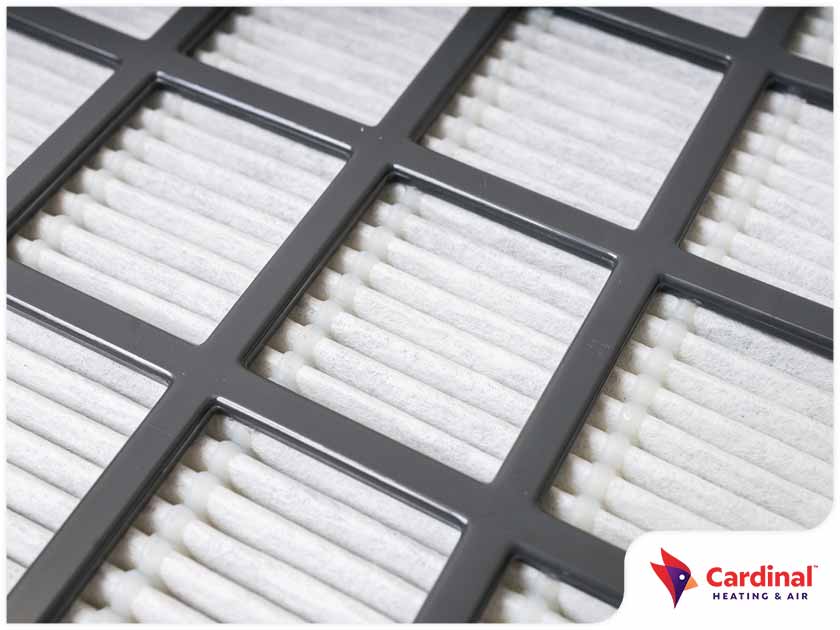July only Free Second Opinion on HVAC Replacement Systems! View More Offers
HEPA vs. MERV Filters: Choosing What’s Best for Your Home
When it comes to safeguarding your home’s indoor air quality, the choice of your HVAC or furnace filter is pivotal. You’ve likely encountered the terms “HEPA” and “MERV” in your search for the perfect filter. While it’s tempting to opt for the highest number, assuming it provides the best defense against airborne contaminants, there’s more to the story. At Cardinal Heating, we believe in delivering tailored solutions that suit your unique needs and preferences.

The Cardinal Approach to HVAC Maintenance and Air Filters
Selecting the right filter involves a careful consideration of factors like the number of occupants in your home, their health conditions, and your HVAC system’s usage patterns. To shed light on this crucial decision, our Indoor Air Quality (IAQ) and HVAC maintenance experts are here to guide you.
Unveiling the Magic of Air Filters
Air filters may seem simple, but they play a vital role in maintaining your indoor air quality. These filters are crafted from interwoven fibers arranged in random patterns. As airborne particles pass through, they undergo specific filtration mechanisms:
- Inertial Impaction: Large particles, driven by inertia, collide with filter fibers and get trapped.
- Interception: Particles following gas streams that come into contact with fiber surfaces are captured.
The MERV Rating System
MERV stands for Minimum Efficiency Reporting Value, a metric developed by the American Society of Heating, Refrigerating, and Air Conditioning Engineers (ASHRAE). This rating evaluates filter efficiency in capturing particles sized between 0.3 to 50 microns.
MERV ratings range from 1 to 16, representing different levels of filtration. Filters with MERV ratings between 1 and 4 are considered low grade, effectively removing dust, pet dander, hair, dust mites, mold, and pollen. Filters rated 5 to 12 offer medium-grade filtration.
For superior performance, opt for high-efficiency filters rated between 13 to 16 MERV. These filters can remove 75% or more of airborne particles, including biological contaminants, chemical fumes, volatile organic compounds, and smoke. Keep in mind that MERV values can vary among brands.
Enter HEPA Filters
High Efficiency Particulate Air (HEPA) filters are recommended by HVAC maintenance experts when system compatibility and environmental considerations align. HEPA filters stand out as the only mechanical air filters tested and certified for specific efficiency at a precise particle size. All HEPA filters boast a minimum efficiency of 99.97% at 0.3 microns—a remarkable feat considering the average human hair strand measures about 45 microns.
To put this in perspective, imagine introducing 10,000 particles measuring 0.3 microns into a HEPA filter. Only three particles would pass through. This highlights the superiority of HEPA filters, which capture at least 50% more particles than MERV filters, rated to capture around 95% of particles ranging from 0.3 to 1.0 microns. HEPA filters are typically rated between 17 to 20 MERV, surpassing the highest MERV rating of 16.
Considerations for HEPA Filters
It’s important to note that HEPA filters may require an additional fan system for effective air filtration. To determine compatibility, consult a certified air conditioning and heating service technician. Professional installation of the fan, if needed, is crucial to prevent overworking your HVAC system, which can lead to increased energy bills and strain on other components.
Choosing the Right Filter for Your Home
For most homes, HEPA filters may not be necessary. HVAC and thermostat experts often recommend filters with MERV ratings between five and eight for households without allergies or respiratory issues. Filters in this range provide ample dust and pet dander control.
Filters rated 9 and above are ideal for those seeking enhanced air quality. Ratings from 13 to 16 are recommended for commercial settings and individuals with specific health concerns.
When replacing your air filter, consult your trusted HVAC technician to ensure compatibility with your system. Achieving a well-balanced ventilation system is key to maintaining clean and safe indoor air quality.
Cardinal Heating & Air: Your Partner in Comfort
If you’re seeking a reliable air conditioning and heating service expert, look no further than Cardinal Heating & Air. Our professional services guarantee efficient HVAC installation. To embark on your journey toward cleaner, safer indoor air, contact us at (425) 827-9997 or fill out our convenient online contact form. Choose Cardinal Heating & Air and breathe easy in every season. Call us today!